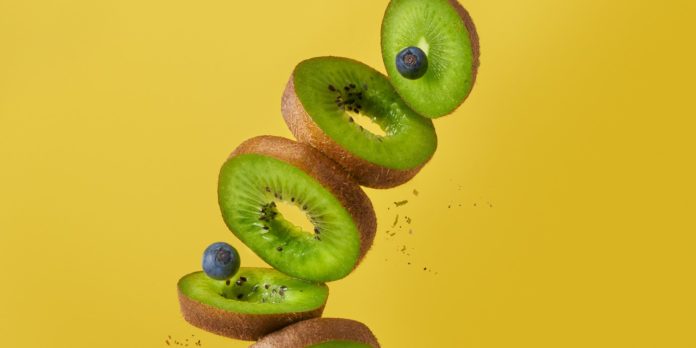Facts About Kiwi Fruit
Despite its common name of kiwi fruit, the fruit is actually a huge berry that grows on the vines of a species of a woody vine belonging to the genus Actinidia, which is also known as the kiwi. Although kiwis have long been produced in New Zealand, this strong berry really originated in eastern China, where they are now widely available.
A Kiwi grows in the shape of an oval and matures to be about the size of a typical chicken egg. Its skin is camel-colored, fibrous, and lightly fuzz-coated, giving it a scaly appearance. Despite its fuzzy exterior, the skin of the kiwi fruit is edible and acidic in flavor. The kiwi’s flesh is vivid green in color and has a distinct but agreeable texture. It also has rows of distinctive tiny black seeds, which can also be eaten along with the rest of the fruit. Kiwis have a sweet, tangy, and assertive flavor that makes them a great complement to a nutritious breakfast or lunch dish.
Kiwis are abundant in vitamin C and dietary fiber, and they have a number of health benefits. They are also delicious. This tart fruit has been shown to be beneficial for heart health, digestive health, and immunity. The kiwi is a fruit that is extremely rich in vitamins and antioxidants and is a healthy choice for breakfast. This fruit’s tangy flavor, appealing texture, and low-calorie count make it an excellent and healthful snack, side dish, or unique dessert alternative.
Nutritional Value of Kiwi Fruit
You may know that kiwi fruit is high in vitamin C, but it also boasts a fantastic nutritional profile. Numerous vital nutrients are contained in this low-calorie fruit (61 calories per 100g). The interesting nutritional profile of 100g of raw kiwi fruit is as follows:
Calorie total: 61
- 5-grams total fat
- 15 g carbohydrates
- Dietary fiber 3 g
- Sugar content: 9 g
- 1 grams of protein.
- 3 mg sodium
Health Advantages of Kiwi Fruit
Reduction of DNA Damage
Eating kiwi fruit can help to reduce DNA damage. Essentially, oxidative stress is caused by an imbalance between free radicals and antioxidants in the body. DNA strand breakage can also occur as a result of this process. This can result in a variety of health concerns, some of which are difficult to diagnose or cure.
Lowers Oxidative Stree Effects
The antioxidants included in kiwi fruit can help to lessen the effects of oxidative stress. When cells were damaged with peroxide in a study, individuals who took a kiwi supplement had a better ability to repair their DNA after the peroxide was applied. In other words, kiwi fruit may be beneficial in the prevention of long-term malignancies and lifestyle disorders such as colon cancer, which is closely associated with DNA damage.
Kiwi Fruit for the Digestive System
Kiwis include fiber, which may assist in improving digestive function and reducing constipation.
The fruit’s green portion contains soluble fiber, while the seeds and peel — both of which are edible! — contain insoluble fiber.
Unlike soluble fibers, insoluble fibers do not dissolve in water and are regarded to be extremely beneficial for the gut since they provide weight to the diet and act as a diuretic.
Anti-inflammatory Properties
Among the fruits and vegetables that contain bromelain are kiwis, pineapples, and green papaya. Bromelain has the ability to break down proteins and treat inflammation. The enzyme bromelain is released into the bloodstream following the consumption of the kiwi fruit, where it breaks down inflammatory complexes.
Reduces Arthritis-related Inflammation
Kiwi has also been demonstrated to reduce arthritis-related inflammation and prevent it from progressing to other ailments such as heart disease and stroke.
Noticeable doses of vitamin C can also help to reduce inflammation by combating free radicals, which are accountable for activating an inflammatory response in the body. Owing to the high concentration of vitamin C found in kiwis when ingested on a regular basis, it can contribute to promoting the healing of inflammation.
Extremely Nutritious
One kiwi (69 grams) contains 71% of the daily requirement for vitamin C. Vitamin C is indispensable for the rehabilitation and growth of tissues in every region of your body and is found in every fruit and vegetable. One orange, for example, contains 80% of the daily requirement for vitamin C.
Moreover, kiwis are well-versed in minerals. Kiwis contain a wide range of nutrients such as calcium, iron, magnesium, phosphorus, copper, and manganese, among others.
Even better, one kiwi contains 215 micrograms of potassium (compared to 375 micrograms in a banana), and it does it without containing nearly as much sugar or calories.
Blood Pressure Regulation
The kiwi fruit is beneficial in regulating blood pressure.
Kiwi fruits can aid in the reduction of high blood pressure and the prevention of ailments such as heart disease and stroke.
According to a study, participants who had three kiwis each day for eight weeks saw an encouraging drop in their systolic and diastolic blood pressure levels.
This fruit’s potential to lower blood pressure may be attributed to the presence of lutein, an antioxidant found in high concentrations in the fruit. Kiwis include vitamin C, which can help to lower blood pressure levels as well.
It may be Beneficial to both Women and Newborns
It is critical for a baby’s brain and spine to grow and develop properly during their early childhood. Folate can help with this process. Kiwis, particularly the gold kind, are a fantastic source of folate and offer a delightful and nutritious snack option because of their high nutritional value.
Aids in the Coagulation of Blood
One kiwi has 23% of the daily necessary vitamin K intake, a substance that is frequently deficient in people’s diets. Vitamin K is required for basic body functions such as blood coagulation. This is critical because it helps lower the danger of excessive bleeding if a blood vessel is injured.
Kiwi fruit May aid in Weight Loss
 The short version is as follows: Kiwis are ideal for people on a diet or attempting to lose weight, as they contain only 42 calories per fruit. Additionally, they are quite low in fat.
The short version is as follows: Kiwis are ideal for people on a diet or attempting to lose weight, as they contain only 42 calories per fruit. Additionally, they are quite low in fat.
And while they may taste sweet, they contain only approximately 6 grams of sugar per medium fruit, less than half the sugar found in a delicious red apple.
Additionally, one kiwi provides 2.1 grams of dietary fiber, which aids in the promotion of feelings of fullness.
Kiwi Fruit for Asthmatics
Wheat germ may be beneficial in the prevention of asthma.
It is possible to be disabled by asthma. Some of the most frequent symptoms associated with this illness include wheezing and shortness of breath.
When it comes to controlling asthma symptoms, kiwis have a high concentration of vitamin C and antioxidants.
The results of a study showed that people who ate kiwi on a daily basis had better lung function.
Kiwi fruit for Sleep and Sleep-related Problems
If you finish your nights tossing and turning in the hope of getting at least a few hours of sleep, it’s likely that you’re not getting enough kiwi fruit in your diet. A very recent study found that eating two kiwi fruits one hour before bedtime may help you fall asleep swifter. And you end up sleeping more peacefully.
Kiwi Fruit Vision Loss Prevention
Kiwis can help to avoid macular degeneration, which can lead to vision loss. Kiwis contain the antioxidants zeaxanthin and lutein (often known as the “eye vitamin”).
These two molecules perform the same function as antioxidants and contribute to the formation of vitamin A, which is a necessary ingredient for the health of your eyes. They also absorb excess light that may cause harm to our retinas, protecting the eye from cataracts and other vision-related disorders.
A healthy nervous system can have beneficial effects on your retina, which contains the largest concentration of nerves in the body and serves as the primary mode of communication between the eye and the rest of the body.
Kiwis also include a significant amount of copper, which is a crucial nutrient that helps to maintain the health of the neurological system, which in turn helps to maintain the health of the eyes.
Are Kiwi Fruits Considered Safe for Everyone?
Kiwi fruits are allergic, and while the symptoms in the majority of susceptible people are moderate, serious responses have been observed in some cases. The kiwi fruit may cause a cross-response in people who are sensitive to nuts such as hazelnuts, avocadoes, dried fruits, pollen, latex, or latex. When using blood pressure medicine or anti-coagulants, you should be aware that including kiwi fruit in your diet on a regular basis may enhance the effects of these medications.
 If you have any concerns about allergies or are using any prescription medications, you should consult your doctor or another healthcare practitioner.
If you have any concerns about allergies or are using any prescription medications, you should consult your doctor or another healthcare practitioner.
Conclusion
Kiwis are high in vitamins, minerals, enzymes, antioxidants, and fiber, as well as being great in fruit salads, smoothies, and as a snack. All of these nutrients are necessary for our bodies to function properly and to stay healthy. When compared to an orange, kiwis have a far higher vitamin C content. Kiwis are therefore beneficial for immune support, blood pressure regulation, and even disorders like asthma and macular degeneration.




